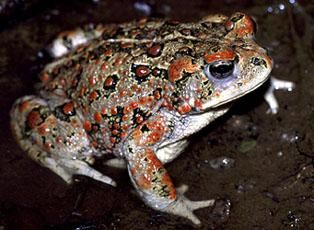| DescriptionBoreal toad (Anaxyrus boreas) (7046220291).jpg |
Boreal toads may reach a length of 12.7 centimeters (5 inches). They possess warty skin, oval parotid glands, and often have a distinctive light mid dorsal stripe. During the breeding season, males develop a dark patch on the inner surface of the innermost digit. Unlike many other toad species, the boreal toad has no vocal sac and, therefore, no mating call. Tadpoles are black or dark brown.
Boreal toads in the Eastern population typically lay eggs from mid-May to mid-July in shallow areas of pools, ponds, lakes, and slow moving streams. Within 2 weeks the eggs hatch and the larvae (tadpoles) metamorphose into toadlets, typically from the end of July to the end of August but as late as the end of September. Adults move to upland habitat after the breeding season, then adults and juveniles move to hibernacula (winter quarters) in the fall to overwinter. Boreal toads prefer post breeding upland habitats that are more humid or moist, but they are able to forage in or take advantage of drier sites especially if puddles or cool, moist, burrows are available to regulate body water and temperature levels.
Boreal toads occur from coastal Alaska south and east through the Yukon Territory, the extreme southwest corner of the Northwest Territory, British Columbia, western Alberta, Washington, Oregon, northern California, northern Nevada, Idaho, western Montana, western and southeastern Wyoming, central and northern Utah, central to western Colorado, and extreme north-central New Mexico. The Eastern population of this amphibian occurs in portions of Colorado, Idaho, New Mexico, Nevada, Utah, and Wyoming. Boreal toads occur in a variety of habitat and occur as low as sea level on the Pacific coast, but in the Eastern population they typically occur in subalpine habitat from 2,440 meters (8,000 feet) to 3,350 meters (11,000 feet).
For more information about the Eastern population of the boreal toad and this finding, please visit the Service’s website at www.fws.gov/mountain-prairie/species/amphibians/borealtoad.
Photo Credit: Chris Brown / USGS |



